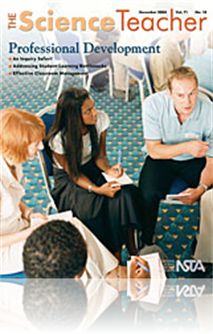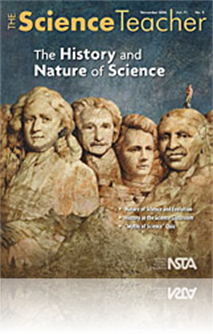All The Science Teacher resources
Journal Article
Idea Bank: Diving Into Professional Development
The challenge of the Research and Education: Volcanoes, Exploration and Life (REVEL) Project, sponsored by the University of Washington School of Oceanography, is to teach, energize, and reinvigorate teachers, so that they can excite their students a...
Journal Article
The Virtual Gorilla Modeling Project (VGOR)—a professional development project—is a collaboration of middle and high school in-service teachers, Zoo Atlanta primatologists, science and computer educators, and students. During a 10-day professiona...
Journal Article
Astrobiology refers to the “origin, evolution, and distribution of life in the universe.” Astrobiologists study extreme environments on Earth and characterize the life forms that occupy them. These environments provide Earthly analogues to enviro...
Journal Article
Commentary: Taking Responsibility for Professional Development
The No Child Left Behind (NCLB) Act of 2001 contains numerous references to “high-quality professional development. The quantity and the quality of professional development are critical issues in the NCLB Act with direct impact on student achieveme...
Journal Article
Editor's Corner: Learning to Like Professional Development
Science teachers today face unprecedented opportunities for professional development. From genomics to planetary exploration, new scientific discoveries are announced almost daily, discoveries that are changing our basic understandings of nature. New...
Journal Article
Teachers can easily identify what subjects their students have trouble with, whether it is transcription and translation, glycolysis and fermentation, balancing chemical equations, or vector analysis of forces acting on an object. This article descri...
Journal Article
Focusing Labs on the Nature of Science
After learning about the scientific method, students are often left with mistaken impressions about how scientists work. This article seeks to give students a better understanding of the nature of science through laboratory work. Open-ended exercises...
Journal Article
Incorporating History into the Science Classroom
The use of history in science courses can humanize science, help students refine their critical thinking skills, promote a deeper understanding of scientific concepts, and address common student misconceptions that often resemble those of past scient...
Journal Article
Keys to Teaching the Nature of Science
Despite continuous and well-reasoned recommendations that students need to have an understanding of science as a human endeavor and the nature and history of science across all grade levels, some students and teachers alike still fail to understand e...
Journal Article
Editor's Corner: News Flash—<em>Science Is Important</em>
This issue of The Science Teacher is our attempt to give you some tools to move the understanding of science to the majority, to help provide a more secure future for the scientific habit mind. In our classes, we must help students understand the s...



